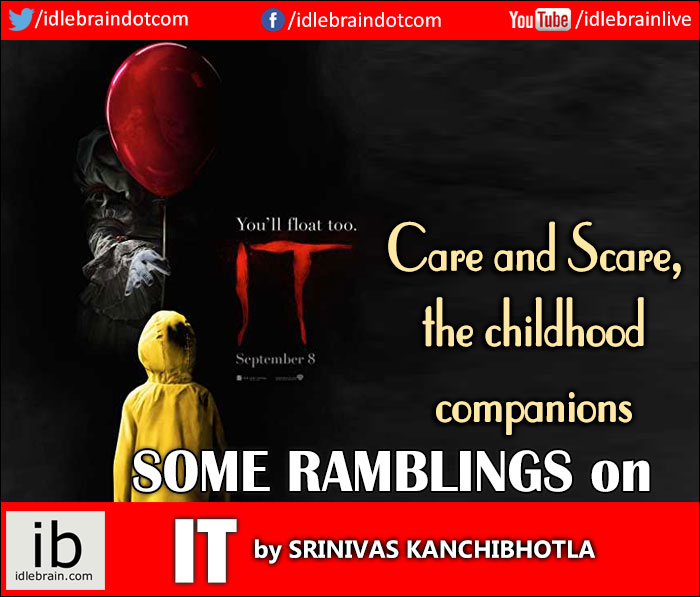
Childhood and horror are a match made in heaven. In both instances, lack of understanding drives up the fear factor. The first hard slap across the face of an unwitting child dawns a rude awakening in him of the bitter fact that his actions might welcome unanticipated consequences to shatter his hitherto idyllic view of the world. (ex: the same kind of mischief that earlier earned him a warm ruffle of his hair, this time around might treat him with a reddened cheek, making it impossible for him to reconcile with this dichotomy). Same goes with horror, with adults. That things can turn quickly on their head, slip out of the hand and reach to unmanageable levels (which is the true essence of horror) is a terrifying prospect in the grown up world (the road rage incidents, the petty squabbles that turn deadly). Now combine the two, the impressionable age that is childhood, with the incomprehensible result, that is horror, and mixture is more explosive than a TNT. In contemporary fiction, none understood that equation better than Stephen King. The kids in his creations might be precocious, have special powers, talk dirty and run off their motor mouths, but they are still kids stumbling their way through life in a world that isn't entirely logical. It is in that divide of their understanding and the actual reality that King sets his stories in. For a kid, the demons, the terrors, the nightmares that haunt him, chase him and drag him to the doorstep of unbelievable pain, might all be as real as the imaginary ghost lurking in the darkness waiting to pounce upon him. And for King, childhood is the scary suspension bridge to adulthood and every little swing of it or a misstep on it might tip it over to certain doom, and that is the price of growing up. And rare are the ones that have crossed it, in his stories, with their sunny disposition towards life, in general, in tact. The horrors and terrors might be metaphorical, but the pain and the suffering are all too real, more when, there is a short supply of logic and understanding at that age.
'It', his only tome that almost exclusively dealt with the horrors of childhood, finds a worthy movie adaptation, mainly by restricting itself to the point of the view of the kids, a la 'E.T.', where the imagination seamlessly blends with reality making the terror palpable. It was a wise move by the writer(s)/director to split the novel's overlapping narratives of the kids' and (who eventually come back as) adults' who confront the evil lurking in the sewers in their hometown, and present this section (or 'Chapter 1' as it calls it) as a linear story of a motley of misfits banding together and vanquishing their personal and collective nemeses. For an author with an unsurpassed record of having the most number of books turned into movies (and tv series), King also cops the dubious record of having many of his page turners turned into yawn-fests, with a few exceptions. The reason is pretty simple. For horror to work, the build up to it, the drama, needs to be believable. The more time spent on the drama, the better is the horror pay-off. While the print medium offers King the luxury to flesh out the characters and build up the drama to then subject them to unspeakable horrors, the fast moving movie time is rarely conducive for such deliberate pacing and elaborate plotting. It is for this reason his suspense and dramatic fare fare much better than his horror ('Misery', 'Dolores Claiborne', 'The Shawshank Redemption') and it took someone like Stanley Kubrick to alter King's perspective (of horror stemming from personal demons) and gave it a new twist (as horror being more systemic and institutional) when he adpated 'The Shining'.
One thing is clear, if King's works need to work on the screen (and the latest mishap 'The Dark Tower' proving the point even more vociferously), they need more room to breathe, to develop, to stretch their limbs....and 'It' does just that. Instead of rushing the drama to get to the horror, in a wise aesthetic (and business) move, the movie is split into parts, with this first installment allowing the kids' characters to grow and bond and create the solid foundation for the ensuing bloodbath. The casting is almost perfect and the dialogue (most of it, verbatim from the novel) true to their ages, is crude, profane and often quite funny (a welcome departure from sanitizing the dialogue to earn a more favorable rating). It is this camaraderie that carries the movie on its shoulders and when the horror eventually befalls then, nothing seems forced, rushed and out of place, with all the beats and moves, nicely accounted for. However much an author can disassociate himself when his creation changes mediums, there are always pangs of separation, anxiety, and worry about its well-being and reception in the unknown land. Enough to say that this adapatation would leave King mightily satisfied, proud even, and that didn't happen very often to someone who had seen a majority of more than 40 novels of his yield unintended consequences.
checkout http://kanchib.blogspot.com for Srinivas's Blog.
